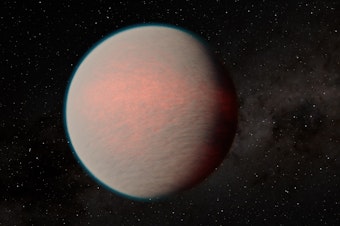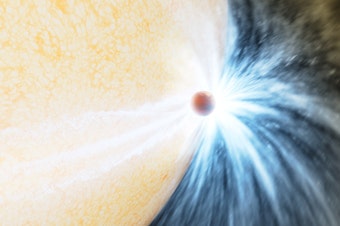Nell Greenfieldboyce
Stories
-

Science
The James Webb Space Telescope reveals a mysterious planet to be weirdly shiny
Astronomers pointed the James Webb Space Telescope at a common kind of planet that's bigger than Earth but smaller than Neptune. What they saw wasn't what they expected.
-

Science
This star ate its own planet. Earth may share the same fate
For the first time, astronomers have caught a star in the act of swallowing a planet, providing a glimpse into how the sun may eventually eat up Earth.
-

Science
Welcome to the mammalverse: Scientists sequence DNA from 240 species around the world
Researchers have examined the genomes of 240 mammal species. The project reveals when mammals evolved, how some developed the ability to hibernate, and clues that may help explain humans' brains.
-

Environment
This floating ocean garbage is home to a surprising amount of life from the coasts
A study of plastic trash hauled out of the Pacific Ocean found that most of it had been colonized by coastal life that was thriving right next to species that normally live in the open sea.
-

Science
Goodbye fuzzy donut: The famous first black hole photo gets sharpened up
Scientists have created a new version of a historic black hole image that was first unveiled back in 2019. The central black nothingness now looks larger and darker.
-

Science
Scientists think they know why interstellar object 'Oumuamua moved so strangely
A strange comet-like object discovered over 5 years ago was the first known visitor from another solar system. Its movement though space was so odd that scientists struggled to explain it, until now.
-

Health
Stone flakes made by modern monkeys trigger big questions about early humans
Monkeys using stones to crack open nuts generate many stone flakes accidentally that look exactly like the ones archaeologists have long thought early humans made intentionally as tools. Oops.
-

Science
Scientists find signs of horse riding in ancient human remains
Researchers have found evidence of horseback riding in skeletal remains of people who lived about 5,000 years ago, adding to a body of research on when people first started using horses to get around.
-

Science
Here's why Jupiter's tally of moons keeps going up and up
The first astronomer to discover moons around Jupiter was Galileo, back in the year 1610, but astronomers are still finding more and more moons around this gas giant.
-

Technology
What's the fairest way to share cosmic views from Hubble and James Webb telescopes?
Astronomers are debating how quickly the observations of the Hubble Space Telescope and the James Webb Space Telescope should be made public.